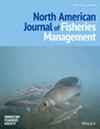Evaluation of techniques for estimating the age and growth of known‐age White Sturgeon
IF 1.4
4区 农林科学
Q3 FISHERIES
引用次数: 0
Abstract
ObjectiveSuccessful conservation and management of fishes require an understanding of their age and growth. However, methods for estimating the age and growth of long‐lived fish species are difficult to validate. The Kootenai River basin has a decades‐long mark–recapture program for endangered White Sturgeon评估已知年龄白鲟的年龄和生长情况的估算技术
目标要成功地保护和管理鱼类,就必须了解它们的年龄和生长情况。然而,估计长寿鱼类年龄和生长情况的方法很难得到验证。库特奈河流域对濒危白鲟 Acipenser transmontanus 实施了一项长达数十年的标记重捕计划。从已知年龄的白鲟(n = 162)的胸鳍鳍条估算年龄,以评估年龄的准确性和精确性。结果读数之间白鲟年龄的一致性为58.7%。与已知年龄的一致年龄差(30.7%),并且随着年龄的增长而下降。在四个反向计算模型中,弗雷泽-李模型的均方根误差和误差百分比最小。由 Fraser-Lee 模型得出的平均龄时反算长度估计值在两个测量断面之间相似。利用鳍条计算白鲟的年龄是不可靠的,而且准确性随着鱼龄的增加而降低。利用已知年龄鱼类的鳍条测量结果反算出的年龄长度是准确的。在使用弗雷泽-李方法时,两个测量横断面的长度估计值相似,这表明它们可以互换使用。
本文章由计算机程序翻译,如有差异,请以英文原文为准。
求助全文
约1分钟内获得全文
求助全文
来源期刊
CiteScore
2.60
自引率
18.20%
发文量
118
审稿时长
2 months
期刊介绍:
The North American Journal of Fisheries Management promotes communication among fishery managers with an emphasis on North America, and addresses the maintenance, enhancement, and allocation of fisheries resources. It chronicles the development of practical monitoring and management programs for finfish and exploitable shellfish in marine and freshwater environments.
Contributions relate to the management of fish populations, habitats, and users to protect and enhance fish and fishery resources for societal benefits. Case histories of successes, failures, and effects of fisheries programs help convey practical management experience to others.

 求助内容:
求助内容: 应助结果提醒方式:
应助结果提醒方式:


